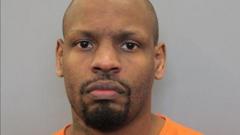Kilmar Ábrego García, recently returned to the US after a mistaken deportation to El Salvador, faces federal charges related to human trafficking. His attorney claims the prosecution is a misuse of power, while the US government asserts substantial evidence against him. The legal and political implications of his case reflect ongoing debates about immigration enforcement and individual rights.
Kilmar Ábrego García Returned to US Amid Legal Controversy and Deportation Confusion

Kilmar Ábrego García Returned to US Amid Legal Controversy and Deportation Confusion
A 29-year-old Salvadoran, mistakenly deported, is brought back to the US to face federal charges of human trafficking, igniting a debate over legal rights and immigration policies.
Kilmar Ábrego García, a 29-year-old originally from El Salvador, has returned to the United States after being wrongly deported in March 2023. He faces federal charges involving participation in a conspiracy to illegally transport undocumented migrants across the country. The US Attorney General, Pam Bondi, announced that El Salvador complied with US requests, releasing him after authorities provided an arrest warrant.
His lawyer argues the charges are unfounded and describes the situation as "preposterous." The White House had previously resisted a Supreme Court order requiring Mr. Ábrego García’s return, but a prolonged legal struggle ensued following his deportation, during which he was held in a Salvadoran prison with over 250 other deportees.
Mr. Ábrego García is charged with two counts: conspiracy to transport aliens and unlawful transportation of undocumented individuals. The US legal system alleges that he played a "significant role" in a smuggling operation over several years, moving thousands of undocumented migrants from Texas to other states. These accusations date back to 2016 and include claims that he transported members of the internationally recognized gang MS-13, allegations he has consistently denied.
His initial court appearance occurred in Nashville, Tennessee, and further proceedings will determine whether he will remain in custody until his trial. Supporters, including attorney Simon Sandoval Moshenberg, condemn the prosecution as an "abuse of power," arguing that his rights have been violated due to the erroneous deportation rather than justice being sought.
While President Trump referred to Mr. Ábrego García as a “bad guy,” his return was underscored by broader discussions of immigration and due process. Mr. Ábrego García was originally granted protection from deportation based on fears of gang violence in El Salvador. The administration’s trajectory in his case continues to attract scrutiny from legal experts and advocates alike, with Maryland Senator Chris Van Hollen advocating for transparency and due process in the legal proceedings ahead.
El Salvador's President, Nayib Bukele, indicated his government complied with the US request, emphasizing cooperation on issues of national security. The case raises significant questions about legal protocols for deportees and the implications of US immigration policies, highlighting the tension between enforcement and individual rights. As proceedings unfold, Mr. Ábrego García's future remains uncertain, and the result will likely impact discussions on immigration law and enforcement across the United States.




















